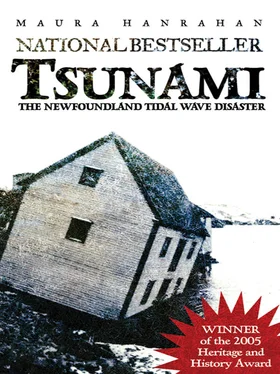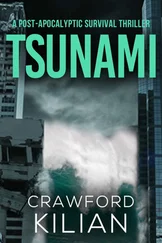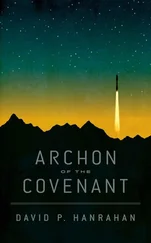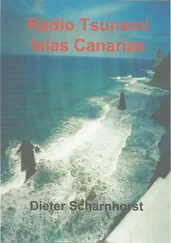By 1881, it had a year-round population of twenty-one, most of whom were adult men. Knowing they couldn’t rely solely on the fishery to keep hunger at bay, they cleared twenty-five acres of land, tossing rocks, pushing boulders, and pulling tuckamore off the earth so they could plant potatoes, turnips, carrots, and cabbage. In the meadows that surrounded the bay they put their one horse, seventeen sheep, fourteen cattle, and fourteen milch cows. Ten years later, there were thirty-six people in Taylor’s Bay, including more women.
Most of the settlers were nominally Church of England, but when did they ever see a minister? They didn’t have a school but one of the women could read well and she gave seven children lessons in her home during the winter. A few years before the tidal wave, Taylor’s Bay was home to eighty-two people; the men fished and the women cured fish on a flat beach that was ideal for such an enterprise. The total value of fish products was at an all-time high. The future looked bright for Taylor’s Bay.
All that ended on the night of November 18, 1929, with the first of the great waves that rushed in on the low-lying lands of the village. The next morning Nurse Cherry set out just after dawn. Her breath turned into almost imperceptible ice crystals as she mounted Thomas Foote’s mare. Thomas, twenty-seven, walked alongside her, carrying a package of warm bread and tea buns his nineteen-year-old wife, Eva, had baked while it was still dark. “For the livyers in Taylor’s Bay,” Eva had said as she pressed it into her husband’s hands. The mare carried Nurse Cherry’s kit and a load of blankets. The Footes had been lucky. Thomas had lost only four quintals of fish and a half ton of coal, substantial, to be sure, but nothing compared to the losses of many of his neighbours whose dories, wharves, stages, and stores were smashed or gone altogether. Albert King, a twenty-three-year-old bachelor, followed Thomas and Nurse Cherry on his bay horse. From the East Side of Lamaline, he, too, had fared comparatively well last night, losing only some fishing gear. He’d have to make it up before the fishing started next spring, but he went to bed counting his lucky stars; things could have been much worse.
Nurse Cherry had an inkling that Lamaline was better situated than some of the neighbouring villages to withstand a tsunami . She had often been to Point au Gaul and Taylor’s Bay to deliver babies and diagnose bronchitis and even the dreaded tuberculosis. But it was Albert and Thomas who came to her last night and impressed upon her how vulnerable to strong waves these settlements really were. She gulped as she listened to them.
“Then we must go there,” she said.
“Yes, Nurse Cherry,” Thomas said. “First thing in the morning.”
“We’ll come by with the horses around dawn,” Albert said, sealing their plans. In the meantime, Eva Foote had gone from house to house gathering whatever blankets she could, just in case any houses had been swept away. Now Albert’s old horse was loaded down with them, too.
Nurse Cherry licked the snow flakes as they travelled, reminiscent of a game she had played with her brothers and sisters when it snowed back home in the northwest of England. The snow had so rarely stayed on the ground there. It seemed only to come in whispers, like a romance. Here it was as heavy as stew and so thick that it seemed to block the rest of the world out. Already she could see that these little flakes would cling to the gelid ground and lay there till the earth began to warm many months from now.
As they walked the road from Lamaline to Point au Gaul, the little group found long splinters—from wharves and flakes that the waves had broken. They came across shards of buttercoloured pottery and sliced heads of cabbage.
“It’s as if God had a temper tantrum,” Thomas said.
Nurse Cherry laughed, but he was right, there was so much destruction. As the wet snow thickened, the ground turned slushy and the horses’ hooves fought with it. The travelling was so difficult Nurse Cherry thought she’d get seasick on Thomas’ mare. Her stomach turned even more and she couldn’t get it to stop when she thought of the Bolton men in the muddy trenches at Passchendaele.
“I’ll walk!” she said finally. It was slow going and the wind stung their necks as their scarves blew and exposed bits of skin. As they reached the top of the hill alongside Point au Gaul, Nurse Cherry said, “From what you’ve told me, I think we ought to go on to Taylor’s Bay first. I’m quite worried about the people there.”
Albert and Thomas nodded their assent. She was a quick learner, their English nurse. Albert stared at her, all eyes ahead under her scarf. How old was she? She seemed middle-aged to him, though she couldn’t have been much more than thirty-five.
The trio halted abruptly when they finally reached Taylor’s Bay. The whole village was now one sweep of ocean. Where there had been a necklace of stages, flakes and boats around the harbour, there was nothing. There was not even a harbour. All the waterfront property was gone. Even worse, so were most of the houses.
Thomas tried to picture them where they should have been. One side of the harbour was known as the Bonnell side, while the other was called the Hillier side. Jacob and Julia Bonnell’s house should be there, he thought. Gus and Dina Hillier’s should be over there. The houses must have been swept away. Where were Jacob and Julia, Gus and Dina? And their children? Were they all dead? He had known it was going to be bad, but now his stomach flopped and he struggled against the retching.
Albert’s breathing had grown heavy and loud. His eyes scanned the horizon for any sign of the missing houses. But instead he saw boulders, strewn all around the meadows. Some of them looked like they had come up from the bottom of the sea. Boats and fragments of stages lay scattered around. There were no people. My God, I hope they’re not all dead, he thought.
Nurse Cherry stole a look at the young men by her side and paled. This was bad. The sea water seemed to be high, or maybe it was just that there were no stages and flakes in the harbour, and, in a sight she never thought she’d see, no boats afloat in a Newfoundland village. Something was really wrong here in Taylor’s Bay. Something in her chest hardened.
“Dear me,” she said. “Shall we get to work, boys?”
Albert and Thomas were like statues coming to life.
“Look at that,” Albert said. “The saltwater comes right into the pond.”
The Bonnell side of Taylor’s Bay was a disaster. A collection of dwellings looked like they had been hit by heavy shellfire, thought Nurse Cherry. She remembered the bombs that had hit Bolton in 1916. A gigantic German airship had dropped five bombs on Kirk and John Streets, destroying six terraced houses and killing thirteen people. Even a horse was killed, Dorothy had realized in horror. The sounds of fire trucks had filled the air all day and night as the airship kept going, dropping more bombs on Washington Street and the Co-op Laundry on Back Deane Road. Would it hit them next… Nurse Cherry shook her head and fixed her eyes on the sight in front of her. The small party knocked on the door of a house that remained standing and then entered. It was the home of William and Catherine Bonnell, a couple in their twenties with four young children. Nurse Cherry’s nose wrinkled at the smell that greeted her. Then she saw a calf and six sheep in the kitchen.
“There’s nowhere else for them, Nurse Cherry,” said William. “The waves were so high they blotted out the stars.”
As soon as he spoke, the nurse’s ears tuned into a loud, erratic rattle.
“Who’s sick?” she asked.
“It’s Catherine, my wife,” William answered. “And John, our second youngest. Both of them had a cold and they got fierce wet last night. Now they’re real sick.”
Читать дальше












